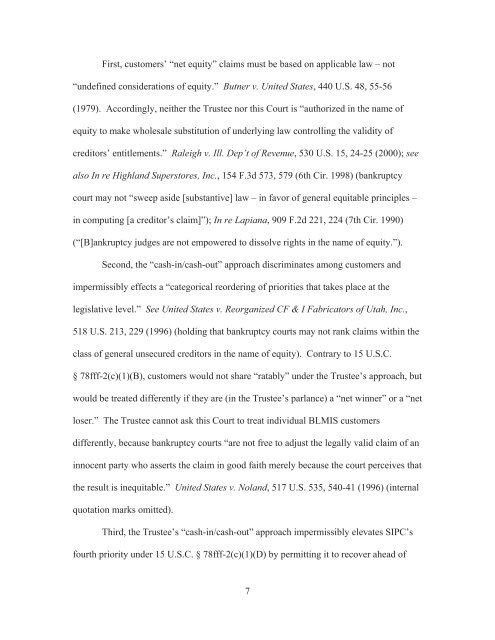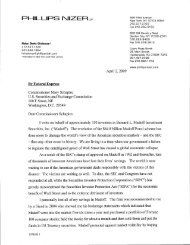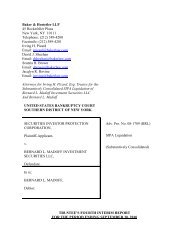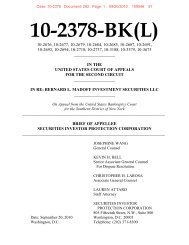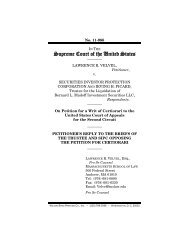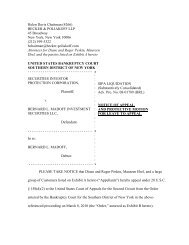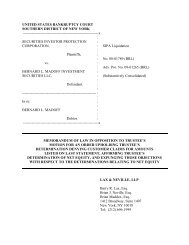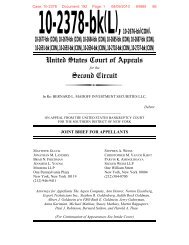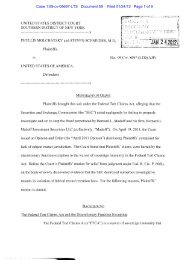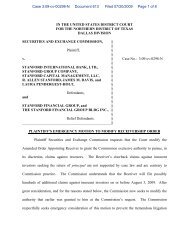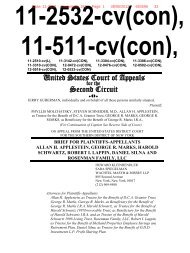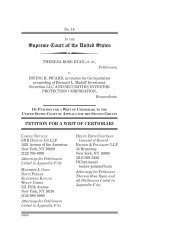Davis Polk & Wardwell LLP 450 Lexington Avenue New York, New ...
Davis Polk & Wardwell LLP 450 Lexington Avenue New York, New ...
Davis Polk & Wardwell LLP 450 Lexington Avenue New York, New ...
You also want an ePaper? Increase the reach of your titles
YUMPU automatically turns print PDFs into web optimized ePapers that Google loves.
First, customers’ “net equity” claims must be based on applicable law – not<br />
“undefined considerations of equity.” Butner v. United States, 440 U.S. 48, 55-56<br />
(1979). Accordingly, neither the Trustee nor this Court is “authorized in the name of<br />
equity to make wholesale substitution of underlying law controlling the validity of<br />
creditors’ entitlements.” Raleigh v. Ill. Dep’t of Revenue, 530 U.S. 15, 24-25 (2000); see<br />
also In re Highland Superstores, Inc., 154 F.3d 573, 579 (6th Cir. 1998) (bankruptcy<br />
court may not “sweep aside [substantive] law – in favor of general equitable principles –<br />
in computing [a creditor’s claim]”); In re Lapiana, 909 F.2d 221, 224 (7th Cir. 1990)<br />
(“[B]ankruptcy judges are not empowered to dissolve rights in the name of equity.”).<br />
Second, the “cash-in/cash-out” approach discriminates among customers and<br />
impermissibly effects a “categorical reordering of priorities that takes place at the<br />
legislative level.” See United States v. Reorganized CF & I Fabricators of Utah, Inc.,<br />
518 U.S. 213, 229 (1996) (holding that bankruptcy courts may not rank claims within the<br />
class of general unsecured creditors in the name of equity). Contrary to 15 U.S.C.<br />
§ 78fff-2(c)(1)(B), customers would not share “ratably” under the Trustee’s approach, but<br />
would be treated differently if they are (in the Trustee’s parlance) a “net winner” or a “net<br />
loser.” The Trustee cannot ask this Court to treat individual BLMIS customers<br />
differently, because bankruptcy courts “are not free to adjust the legally valid claim of an<br />
innocent party who asserts the claim in good faith merely because the court perceives that<br />
the result is inequitable.” United States v. Noland, 517 U.S. 535, 540-41 (1996) (internal<br />
quotation marks omitted).<br />
Third, the Trustee’s “cash-in/cash-out” approach impermissibly elevates SIPC’s<br />
fourth priority under 15 U.S.C. § 78fff-2(c)(1)(D) by permitting it to recover ahead of<br />
7


